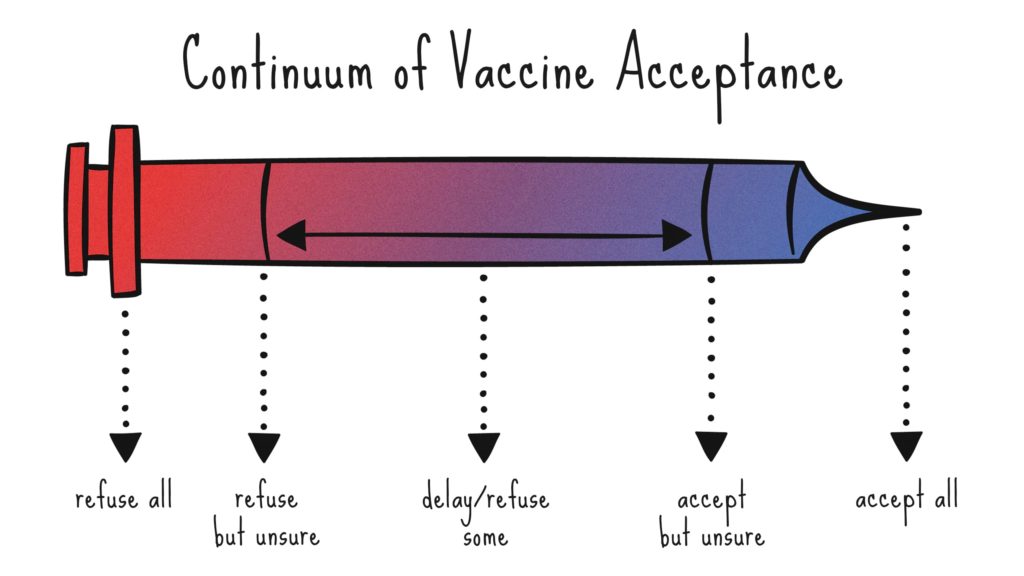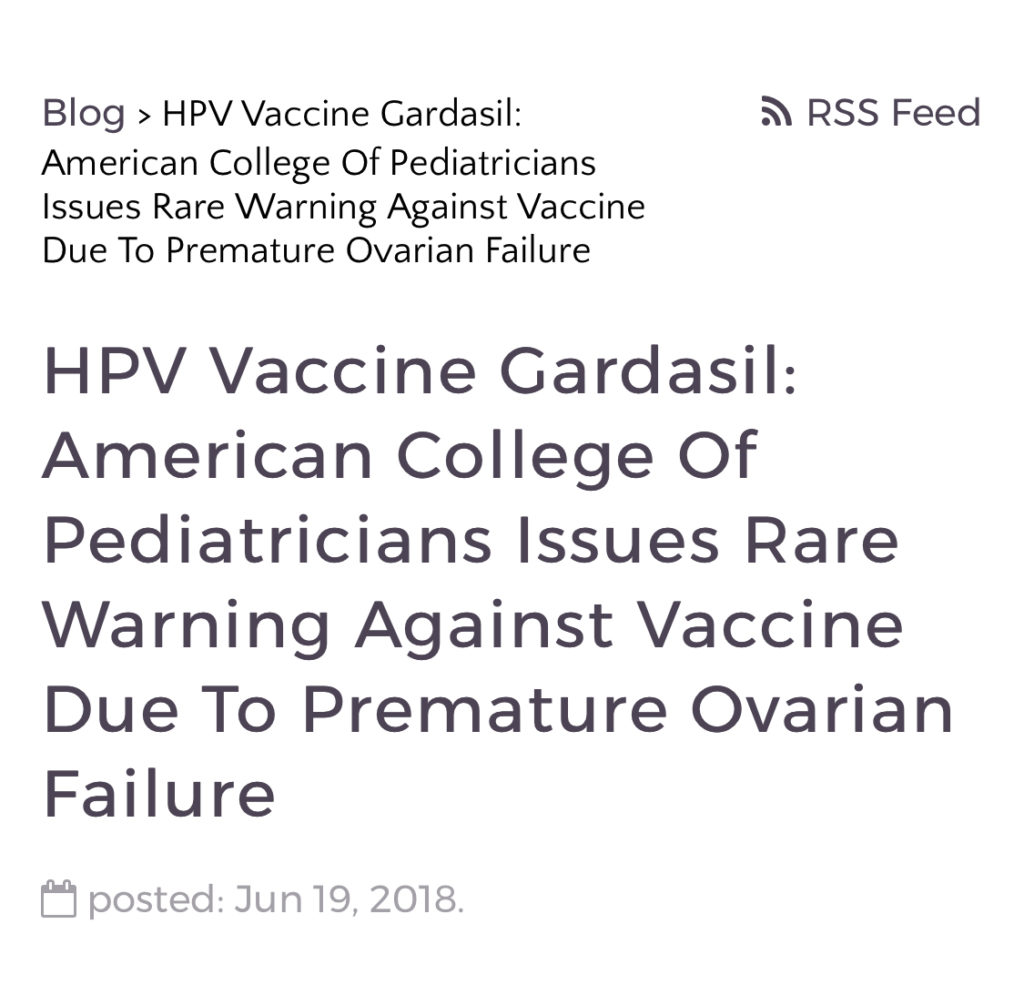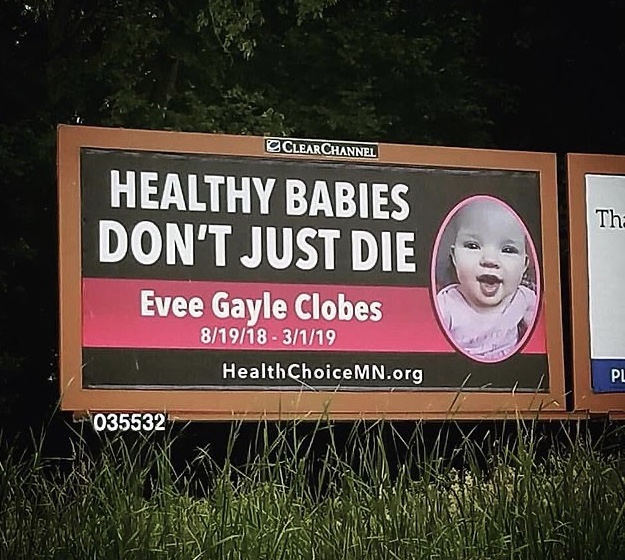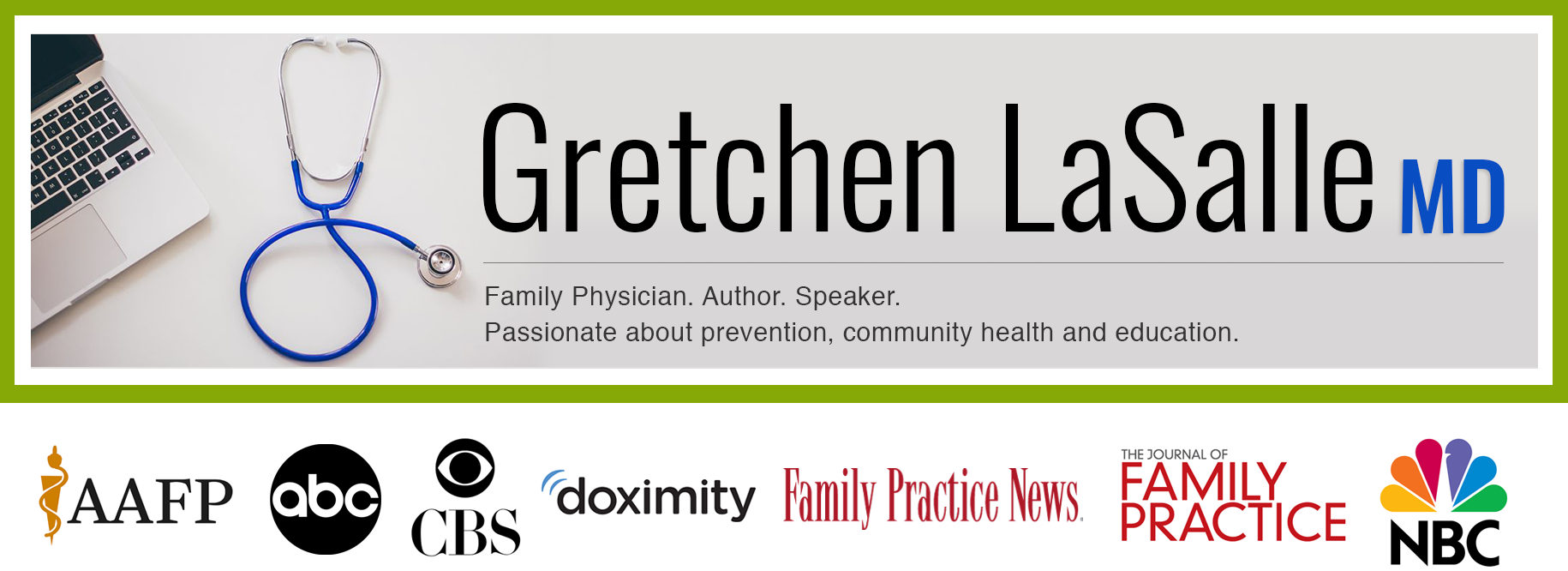As the world races to find a vaccine against SARS-CoV-2 so that we can return to normal life (whatever that new normal will be), you can bet your you-know-what that the anti-vaxxers are going to come out of the woodwork. In fact, they already have. Many have joined forces with the “COVID19 hoax” gang and the “freedom fighters” who are holding armed protests, arguing for their “rights” to congregate in public and not wear a mask (never mind our rights not to die of a highly contagious disease that they give us). I’m writing this week’s blogpost because I want you to be prepared for this. I want you to be able to recognize their tactics, their attempts to manipulate, so that you don’t fall victim to them. Anti-vaccine tactics – how they’ll try and hook you.
But first, I want to be clear about something. When I talk about anti-vaxxers, I am not talking about people who have genuine questions about vaccines or concerns that they desire to discuss further with their medical provider. I’m not talking about those who have heard too many scary stories on Facebook and Twitter, or from friends and family; stories that have planted a seed of doubt. On the vaccine acceptance scale, these folks would be called Vaccine-Hesitant or Vaccine-Questioning.

On the left hand side, you have the anti-vaccine group. On the right, you have the pro-vaccine camp. Everyone else in the middle can rightly be considered vaccine-hesitant or vaccine-questioning.
When I speak of anti-vaxxers, I’m talking about a very particular segment of the population. They are a very small, albeit extremely vocal, group who spend a great number of hours and dollars spreading propaganda. Their goal is to paint the medical community as corrupt and self-serving and to lead you to make a decision that actually puts you and your children in harm’s way.
Some have paranoid beliefs and indulge in conspiratorial thinking, believing things like “they” – pick your bad guy du jour (doctors, the government, the Chinese) – are developing viruses that spread through 5G cell towers to infect people just so “they” can develop a vaccine and make billions of dollars off of it – true tin foil hat kind of stuff.
Some accuse doctors and nurses of willingly and intentionally injecting harmful substances into people, for what purpose I’m not sure. Either they believe that we are setting out to do harm to those we have devoted our lives to caring for or they see us as ignorant and easily duped by “Big Pharma”, pawns in a pharmaceutical game aimed at making money at all costs.
Others, likely because of an inability to accept that what happens in life is not always in our control, believe that somehow eating organic foods (No offense to organic foods. I’m a huge fan of organic foods.) and walking barefoot on the earth and wearing amber beads and doing colon cleanses, for example, are going to give them a superior immune system, magically protecting them from potentially horrible outcomes of disease. Try telling that to people who have taken excellent care of their bodies and still get cancer, or die of a heart attack, or any other variety of terrible maladies. Would the anti-vaxxers suggest that those people brought disease upon themselves because they didn’t live cleanly enough?
Some believe in their hearts that convincing people not to vaccinate will save those people from peril when, in fact, it only increases risk to life and health. Still others are mere opportunists, casting doubt and taking advantage of that doubt to sell you unproven and expensive products.
These are the people that will try and suck you in.
Following is a discussion of common anti-vaccine tactics. I will call them each out and give you examples of what they might look like. And then, when you see one, whether you are reading an article on-line or watching the news or listening to podcasts, you will recognize it for what it is…

A wolf in sheep’s clothing. Photo credit Pixabay.
Let’s begin…
Use of official sounding names and titles
The first thing you may come across is an attention-grabbing headline. It will appear very official. It will look like real news. It may reference research published in journals that lend an air of credibility to it’s claims. It might even include organizational names that sound like they are qualified to speak with authority on the topic. If you choose to read on or listen further, you’ll hear claims of “representing both sides” and talking to “experts”. For example…

First, if one was to read the actual statement by this group, it doesn’t suggest that premature ovarian failure is caused by the HPV vaccine, merely that the question warrants monitoring. Second, this is taken from a chiropractor blog site. Chiropractors are trained to treat musculoskeletal ailments. They are not trained in the diagnosis or treatment of medical conditions. Third, this article references the American College of Pediatricians – a group with a very legitimate sounding name. This is NOT the American Academy of Pediatrics (the trusted national professional organization for US pediatricians). This is a fringe group that broke away when the AAP supported adoption by the LGBTQ community. They are considered a hate group by the Southern Poverty Law Center. If you read only this headline, and don’t dig deeper, you would be completely misled on multiple fronts.
Another example is the site ChildrensHealthDefense.org. This organizational title, unfortunately, sounds very similar to the Children’s Defense Fund, an amazing organization dedicated to the needs of poor children, children of color, and those with disabilities. In reality, ChildrensHealthDefens.org is an anti-vaccine organization run by Robert F. Kennedy, Jr. It is rated by Media Bias/Fact Check as a “strong in conspiracy and quackery level advocacy group that frequently promotes unsupported claims”, also rating them “low for factual reporting due to the promotion of propaganda…”
Appeal to emotion
This is the most common tactic used and, man, is it powerful! As human beings, we react to situations and information emotionally before we react rationally. This is genetically programmed and it is designed to protect us. If a lion is bearing down on us, we get scared, our fight or flight response kicks in, and we run. We don’t stop to think, “How fast is the lion coming? At what angle is he approaching?”. Unfortunately, we react to information, particularly that which threatens or challenges our pre-conceived notions, in this way as well. And this emotional response doesn’t always serve our best interests.
You will read heart-wrenching stories from parents who believe their children were harmed by vaccines. You will feel their grief, and none of us would begrudge them their pain. These will scare you and play on your parental anxieties. They will make you doubt your thoughts and actions. They will activate that fight or flight response.

Billboard featuring Evee Clobes in Medina, Minnesota, from August 2019, from an NBCnews.com story titled “How anti-vaxxers target grieving moms and turn them into crusaders against vaccines.” Clobes died 2 days following her checkup where she received her routine vaccines but the autopsy report and reports from first responders concluded that she actually died of asphyxiation (suffocation) while co-sleeping with her mother.
You will see arguments for the supremacy of the maternal instinct, above all else. This one gets many of us. To be honest, we mothers all feel the value of the mama bear instinct at some point in our careers as mothers… until we realize that giving birth did not make us all-knowing. If it did, we would innately know how to get those babies to sleep or how to manage an angsty teenager.
”Highlighting her sense of authority through intuition as a source of decision making, she explains…it just didn’t resonate”
This tactic will also try to pit you against the “medical establishment” – you, the concerned and loving parents (which you are, of course), against us, the cold, robotic doctors (which we are not). And it will threaten that “questioning the medical establishment” will result in persecution and judgement. When, in fact, many of us welcome questions as a way to open dialogue and to educate.
”Gone are the days when you could blindly follow your doctor’s recommendations or count on your health plan or some government agency to put your best interest first.”
”Pediatricians turn Well Baby Checkups into Vaccine Battlegrounds.”
They’ll try and scare you. Fear is a powerful motivator. They will suggest to you that vaccines are filled with “poisons”; that scientists release immunizations, administered to billions of people across the world, without adequate testing for safety and that they are hiding the truth about the dangers of vaccines. They will suggest to you that vaccine manufacturers are completely immune to liability for any harm from vaccines (they are not). This will make you feel like medicine and science are the Wild West and we are playing fast and loose with your health and safety.
“Toxic Vaccine Ingredients: The Devil is in the Detials.”
Claims of conspiracy, coercion, and corruption
These tactics aim to plant a see of doubt about the motivations of your medical provider and medical institutions. They will suggest that physicians are “in bed” with “Big Pharma”, an industry which, despite it’s many good and useful contributions, has provided us with definite examples of corruption and greed. They will claim we are uneducated, despite our numerous years of scientific and medical education, about vaccines; that the CDC and the WHO are pulling one over on us. They will claim that these organizations are purposefully hiding dangers of vaccines for profit and that physicians are doing the same.
“…some doctors do not want families who do not vaccinate in their practice, not because of health concerns for their patients, but because accepting patients who do not vaccinate disqualifies these doctors from receiving thousands of dollars in bonuses from insurance companies.”
Manipulation using cherry picked data
This tactic represents coercion by numbers. Even though studies show that numbers and statistics don’t really change people’s minds about vaccines, if you can wield a number or a percentage or a statistic in your claims, it lends weight to what you are claiming. But the numbers used and the “data” selected are often cherry picked, plucked out of context, and meant to mislead. As Dr. Vincent Ianelli explains in his article on the topic, cherry picking…
- uses only one or a few out-of-context quotes that seem to support their argument, but ignores the rest of the article or study that doesn’t
- talks about the one study that supports their position, but ‘forgets’ to mention the ten that don’t
- mentions a few years of data that support their argument, but leave out the years that don’t
Those who use this tactic are counting on you to be easily swayed. They are betting that your average person will not be willing or able to dig deeper into the research. If you do dig into the sources they cite as supporting their view, you will often find that they do exactly the opposite.
Assertion that vaccine preventable diseases “aren’t that bad” Inherent in this assertion is the suggestion that natural immunity is better than the “unnatural” vaccine. Because we don’t see the devastation of these diseases anymore, thanks to a history of immunizing, people don’t recognize or remember how deadly they can be.
“Let’s Demolish the Exaggerated Claims about Measles Danger”
Out of site, out of mind. Without this memory, some are inclined to believe that the rare adverse reactions to vaccines are more dangerous than the diseases themselves. This, of course, is not true. You are more likely to get struck by lightening (1 in 3,000 in a lifetime) than to have a serious adverse reaction to a vaccine (1 in 1,000,000).
So what can you do to fight against these tactics?
1. Don’t just stop at a headline. Dig deeper. Unfortunately, we can’t take things at face value anymore. Investigate the source. Does the author have qualifications that would allow them to speak to the issue at hand – are they a scientist, doctor, epidemiologist, public health expert? Or are they a mommy blogger or chiropractor (who don’t have training in the complexities of medical disease and treatment, by the way)? Are they practicing outside their scope of care? If they are, be skeptical.
2. Look into the resources they are citing. Are these resources just circling back to something else they wrote? Are they citing reputable journals or leading thinkers in the field? And don’t stop there. Read the article they are referencing – the whole article. This is the only way you will know if the data they are using is accurate or if it has been taken out of context. And then read other articles on the same topic. Scientific truths are only truths if the findings are reproducible time and again. If one trial finds a particular result but all others find something different, then we can’t really trust that one study. I know this is exhausting. But whether or not to protect yourself or your child from a life-threatening disease is a decision that merits the effort.
3. When something you’re reading or hearing claims to present both sides, ask yourself if they actually do what they claim. Or are they focusing purely on one side of the argument? You’ll find that pro-vaccine folks will often acknowledge the rare risks of vaccines but anti-vaccine folks will make no such concession for the safety and effectiveness of vaccines. Their thinking is generally very black and white. If you are hearing sweeping statements of “always” and “never”, your doubt-o-meter should be rising.
4. Check in with your emotions. Are you feeling afraid and worried? Are you feeling anxious? Then they’ve got you! I think we can all recognize that decisions we make out of fear and anger and worry are not always the most reliable or appropriate. Your medical provider will try to answer your questions and will aim to help you feel comfortable with your decisions. But the anti-vax crowd will only seek to set you on edge and make you doubt yourself.
5. Trust the relationship you’ve developed with your medical provider. You know this person. They have taken care of you and been there for you. Don’t let some invisible disruptor make you doubt that relationship. And if you don’t value the relationship with your clinician, and don’t feel safe and supported in that relationship, you should find a different provider. If you are being judged or persecuted, know that this is not the way it should be. Your physician or other medical provider is meant to be your ally. Recognize that there are bad apples in all walks of life. Don’t let one bad experience sour you to the whole medical profession. These are the caregivers and the healers, people who sacrifice for you and your family.
6. Try to acknowledge when you are caught in an echo chamber. Remember that social media exists to amplify messages, to make them bigger than they would otherwise be if the message was being passed along one person at a time. It also collects data on you and then feeds you what it thinks you want to hear more about. Case in point, when my son searches for basketball shoes on the web, all of a sudden my Facebook feed is bombarded with advertisements from Nike and Adidas. In the realm of information exchange, this can make it feel like “everyone” around you has the same concerns or questions that you do about vaccines. And doubt feeds doubt.
7. Ask yourself, “What if I looked at this vaccine question from a different point of view?” Try looking at it from the point of view of a parent who has lost a child to a vaccine-preventable disease or a person who has suffered from a cancer that was preventable with a vaccine. Try looking at it from the point of view of the public health department, whose job it is to keep as many people healthy and safe as possible. How might you think differently? Being able to honestly evaluate both sides of an argument is a skill that not many use. But it is extremely important.
8. When in doubt, use fact checking sites to help you determine the veracity of a claim. There are some really great options for this. In addition the one mentioned above (MediaBiasFactCheck.com), check out…
• PolitiFact is my favorite, mostly because of the scale that they use (their “Truth-O-Meter” ranges from True to Pants On Fire). This organization fact-checks statements made by politicians (and politicians will sometimes make claims regarding topics in the sphere of science and medicine, such as vaccines).
• FactCheck.org is another handy site that is headquartered at the Annenberg Public Policy Center, a nonpartisan, nonprofit “consumer advocate” group. Their SciCheck feature “focuses exclusively on false and misleading scientific claims that are made by partisans to influence public policy.”
• Snopes is a site that comments on the truthfulness and accuracy of not just political statements but any claim relating to urban legends, folklore, myths, rumors, and misinformation.
9. Learn the history of vaccine-preventable disease. Unless you are inclined toward conspiracy theories, it will be difficult to ignore the devastation that our communities incurred at the hands of diseases like smallpox, influenza, polio, measles, and more. We are living with a pandemic, caused by a virus that we currently have no way of preventing or treating. If we fail to immunize enough people against SARS-CoV-2, we will be forced to continue measures such as masking and social distancing to attempt to contain the disease. We will see further heavy loss of life and terrible economic burden as a result. Likewise, if we allow immunization rates to fall for diseases against which we DO have vaccines, we will see return of even more deadly disease.
The decision to not vaccinate is one that should NOT be taken lightly. We owe it to our families and communities to dig deeper into the claims that we hear. Vaccines have a long track record of effectiveness and safety. Indeed, vaccines are the reason we don’t see deadly vaccine-preventable diseases as often anymore. But if we stop vaccinating, these deadly diseases WILL return. Don’t let scare-tactics and untruths lead you away from protecting the health and life of yourself and your family.


My confidence in science to produce accurate findings is waining. I look at the grossly inaccurate model used to project the death toll of the Coronavirus (COVID-19) and the Hydroxychloroquine article that had to be retracted because the data used could not be verified. Yet it was published and supposedly peer revied. Almost any study I read anymore I look for the obvious as well as hidden conflicts of interest almost even before I read the study. What assurances can we rely on from a pharmaceutical company that stands to make an untold amount of money from being the first on the market with a COVID-19 vaccine that it works and that the side effects are not worse than the disease?
Hi Steve,
I agree that the retraction of studies is frustrating and doesn’t engender confidence. However, the nature of the time we are in, where scientists are working feverishly to learn about this virus and possible treatments for it, may mean that we see a bit more of this happening than we otherwise would. What I think we need to remember are three things. First, we can’t put our total confidence in the finding of one study – if a finding is reproduced time and again (which takes conducting numerous other studies), then we can have greater confidence in that finding. If science is to be done right, it takes time (Which we are short on at the moment). Second, it was through scientific oversight that the errors in scientific rigor were found. Would it have been better found BEFORE publication? Absolutely. We need to hold our scientific journals to a high standard of publication. But… the errors were found and the study retracted. What would be worse is if that faulty information was not discovered and was used as the basis for erroneous treatment decisions. In this case, the system of checks and balances, which is part of the scientific process, worked! Third, remember that media is much more involved in spreading scientific information than ever before. Studies, even preliminary findings that have not been verified, get rapidly released to the public which only serves to confuse and frustrate, especially if those findings are then disproven. Regarding the vaccine, or vaccines, we (scientists, doctors, other medical professionals) want these to be as safe and effective as possible. What good is a vaccine if it doesn’t work or if it does more harm than good. Yes, we want a vaccine as quickly as possible but not at the expense of quality. Making sure we follow a staged approach to vaccine production is extremely important and transparency will be key in giving people confidence in any future vaccine (s).